-
Seed Shop
-
Feminized
Cannabis seeds -
Autoflowering
Cannabis Seeds -
Regular
Cannabis Seeds -
F1 Hybrid
Cannabis Seeds -
CBD
Cannabis Seeds -
Zamnesia
Cannabis Seeds
-
Top 10’s
- Top 10 Feminized Seeds
- Top 10 Autoflowering Seeds
- Top 10 Regular Seeds
- Top 10 USA Cannabis Strains
- Top 10 Zamnesia Seeds
-
Favourites
- Beginner Strains
- Below 1% THC
- Classic Cannabis Strains
- Cup Winners
- F1 Hybrids
- Fast-Flowering Strains
- High CBD Strains
- High THC Strains
- Mix Packs
- Zamnesia Exclusive Collabs
-
-
Headshop
-
Vaporshop
- Spare Parts & Accessories
- AirVape X
- AirVape XS GO (2021)
- Arizer Air MAX
- Arizer Extreme Q
- Arizer Solo 2
- Arizer V-Tower
- Arizer XQ2
- Boundless CFC 2.0 Vaporizer
- Boundless CFX
- Boundless TERA (V3)
- CRAFTY+
- DaVinci IQ2
- DaVinci IQC
- DaVinci MIQRO
- Dr. Dabber Boost EVO
- Dr. Dabber Stella
- DynaVap Omni 2021
- DynaVap VapCap "M" PLUS 2023
- DynaVap VapCap 'M' 2021
- DynaVap VonG (i) Titanium
- Dynavap The "B" Series
- Eagle Bill
- Firefly 2+
- Flowermate Aura
-
Healthshop
-
Smartshop
-
Shroomshop
-
Growshop
-
Seed Shop
All CategoriesSeed Shop
-
Vaporshop
All CategoriesVaporshop
- Top 10 Vaporizers
- Spare Parts & Accessories
- AirVape X
- AirVape XS GO (2021)
- Arizer Air MAX
- Arizer Extreme Q
- Arizer Solo 2
- Arizer V-Tower
- Arizer XQ2
- Boundless CFC 2.0 Vaporizer
- Boundless CFX
- Boundless TERA (V3)
- CRAFTY+
- DaVinci IQ2
- DaVinci IQC
- DaVinci MIQRO
- Dr. Dabber Boost EVO
- Dr. Dabber Stella
- DynaVap Omni 2021
- DynaVap VapCap "M" PLUS 2023
- DynaVap VapCap 'M' 2021
- DynaVap VonG (i) Titanium
- Dynavap The "B" Series
- Eagle Bill
- Firefly 2+
- Flowermate Aura
- Flowermate Cap Pro
- Flowermate Slick
- Flowermate V5.0S Pro
- G Pen Connect
- G Pen Elite II
- G Pen Micro+
- G Pen Pro
- G Pen Roam
- Hydrology9 Vaporizer
- Hyer Big-E Rig
- MIGHTY
- MIGHTY+
- PAX Mini
- PAX Plus
- PLENTY
- Pax 3 Vaporizer
- Puffco Peak PRO Smart Rig
- Puffco Peak Smart Rig
- Puffco Plus
- Storm Vaporizer
- The Proxy (Puffco)
- VOLCANO CLASSIC
- VOLCANO HYBRID
- Vape-Lifter
-
Smartshop
All CategoriesSmartshop
- Top 10 Smartshop
- Zamnesia Gift Cards
- After Party
- Aphrodisiacs
- Aromatherapy
- Blue Lotus
- CBD Vape Juice
- Capsule Machines
- Crystals, Gemstones & Minerals
- Dream Herbs
- Drug Tests
- Extracts
- Happy Caps
- Herbal Tea
- Herbs & Seeds
- Incense
- Kanna
- Kratom
- LSA Seeds
- Mescaline Cacti
- Microdosing
- Nootropics
- Relaxing
- Salvia divinorum
- Smart Seeds
- Stimulants
- Supplements
- Tinctures
- Vape Herbs
-
TRIBE
All CategoriesTRIBE
- My Membership
- Spend Gift Points
- Exclusive products
- Earn Extra Gift Points
-
TRIBE
- Early Access
- Refer a Friend
- Information
-
TRIBE
-
Language
 United States
United States
Wednesday, 23 April and Tuesday, 29 April 2025*
What Are Hemp Seeds?
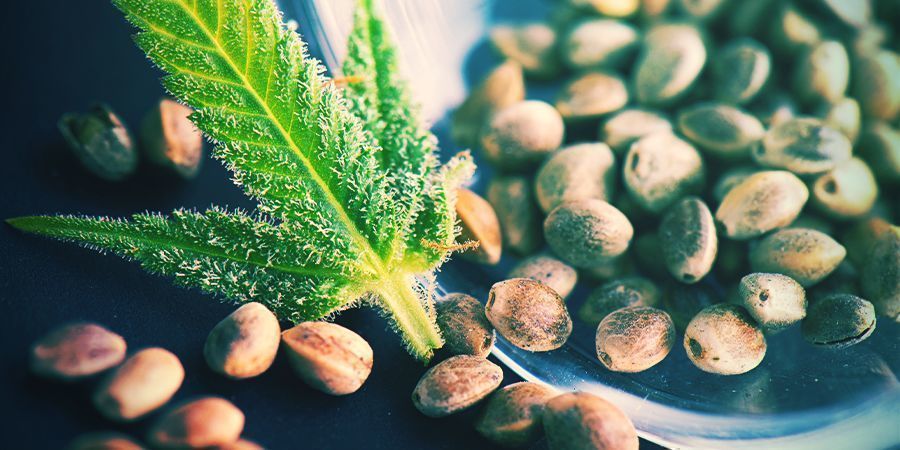
Hemp seeds are a staple of a wholesome diet, but how are they sourced, and what do they have to offer? Furthermore, can you grow your own hemp plants to produce seeds at home?
Hemp and marijuana both derive from the same plant species, Cannabis sativa. Hemp is therefore not a different plant, but considered a distinct variety (strain) of cannabis. Hemp seeds—straightforward enough—are sourced from hemp flowers. Female cannabis plants produce seeds when they've been pollinated by a male plant. Out in nature, this happens when cannabis pollen is transported via the wind. After about 4–6 weeks from pollination, the seeds develop in the flowers (“buds”) of the female plants.
What Is Special About Hemp?
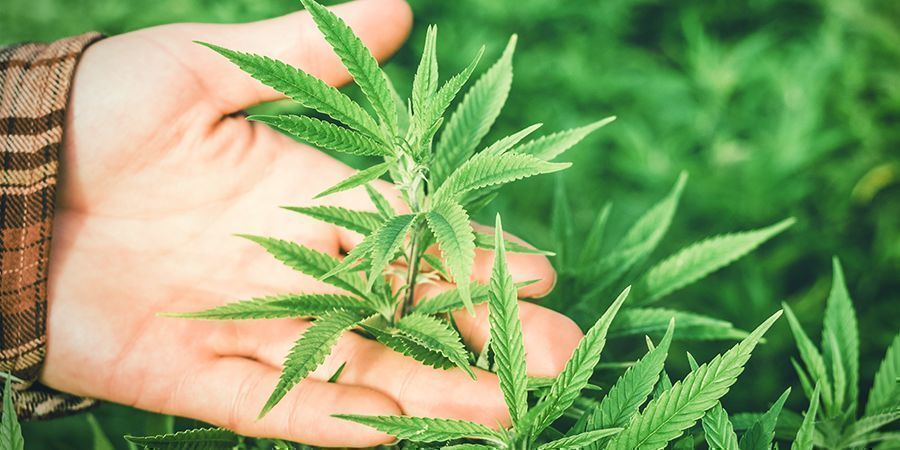
Hemp contains very small amounts of THC—the compound in cannabis responsible for catalysing a high. While cannabis with THC (better known as marijuana) is largely regarded as a recreational drug, people use hemp for very different reasons. Notably, hemp seeds contain no THC, or other cannabinoids for that matter, as the seed hasn't had any time to develop these secondary metabolites.
Etymology of Hemp
It’s not clear where the name hemp comes from. It’s possible that it’s a variation of the word κάνναβις (kánnabis), where the “k” at some point changed to “h” for the Germanic “hanapiz” and henep/hænep in Old English. The Dutch word “hennep”, Danish and Norwegian “hamp”, and German “hanf” may also point to that origin.
Appearance
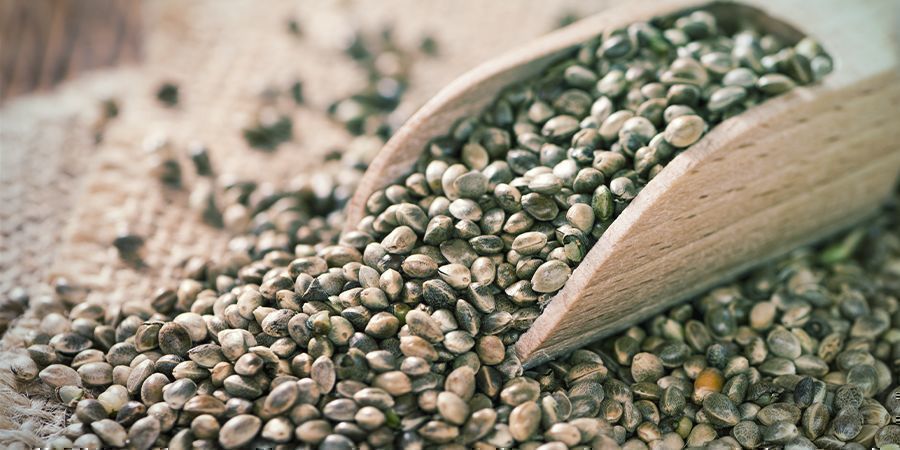
Since both hemp and “marijuana” come from the same plant species, hemp seeds look just like other cannabis seeds. Each seed is 2–3mm in size and has a slightly conical shape with one pointy and one rounded end. They can appear in various shades of brown, often with a striped or spotted texture. Immature seeds have a more greenish colour. The hard shell should have a waxy coating.
The Difference Between Hemp, Marijuana, and Cannabis
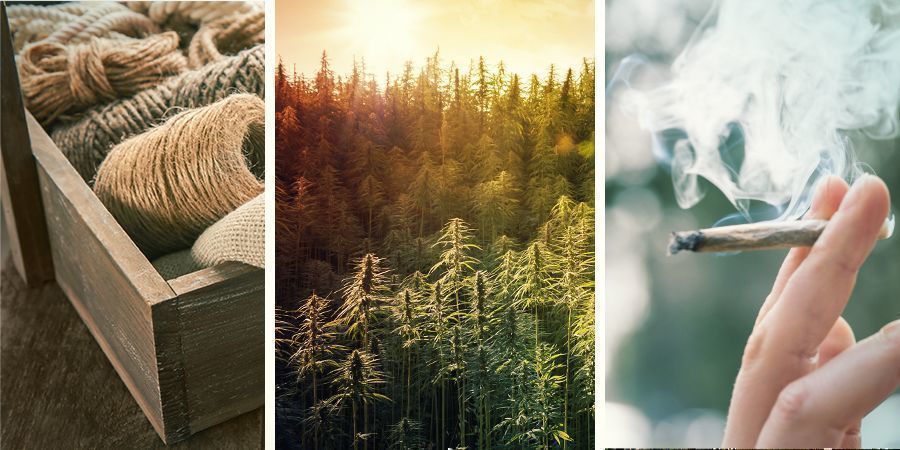
When discussing the differences between hemp, marijuana, and cannabis, it doesn’t help that the terms are often used interchangeably. Technically, “cannabis” can refer to both hemp and marijuana, as they are from the same plant genus.
In practice, however, the words “marijuana” and “hemp” are used based on how much THC a cannabis plant contains. Depending on the law, which varies by country, there are legal limits for what qualifies as “hemp” and what is called “marijuana”. In Europe, cannabis with 0.2% THC or less is referred to as “hemp”. In the US, the legal upper limit for cannabis that can (still) be called “hemp” is 0.3% THC.
Here's a summary of the distinctions between cannabis, hemp, and marijuana.
Cannabis
Cannabis refers to all types of cannabis plants, which includes many variants of the three main species/subspecies: Cannabis sativa, Cannabis indica, and Cannabis ruderalis. As such, cannabis can refer to both “hemp” and “marijuana”.
Marijuana

Marijuana includes strains of cannabis that contain significant levels of THC. It’s the kind of cannabis that people smoke to get high. The potency and effects of marijuana (relaxing, uplifting, etc.) can vary depending on the strain.
Hemp
As mentioned, hemp is a variety of Cannabis sativa that only contains trace amounts of THC. Hemp is predominantly an industrial crop, finding a home in many industries—from construction to textile production. Moreover, the seeds from the hemp plant are a popular “superfood” (more on that later) that can be found on the shelves of health food stores. Finally, CBD can be extracted from unfertilised hemp flowers (those without seeds) to create CBD oils and supplements.
Does Hemp Get You High?
Since hemp contains very little THC, smoking hemp flower won’t get you high. However, since hemp is relatively rich in other cannabinoids, such as CBD, you can still benefit from the non-psychotropic effects of cannabis. Some people use CBD to stay focused and alert, while others find it offers subtle soothing properties.
TIP: If you’re looking to grow your own marijuana as opposed to hemp, check out the Zamnesia Seedshop! There you can find a wide range of popular marijuana seeds to grow!
Benefits of Hemp Seeds
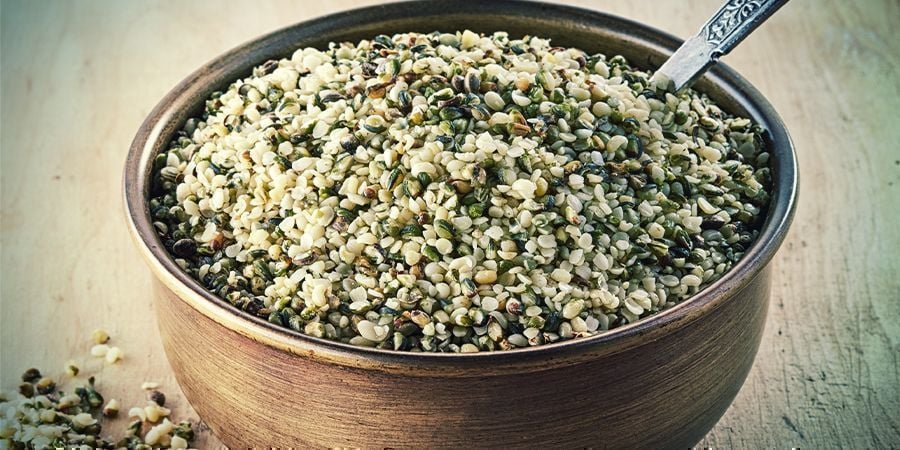
Although people don't use hemp as a “recreational drug” like marijuana, this doesn’t mean it’s useless. On the contrary, hemp is considered one of the most important plants in the history of mankind. Cultivated since ancient times, hemp was used to make sails, clothing, paper, rope, and much, much more. Recently, hemp is seeing a renaissance as a natural resource for biofuel, for eco-friendly construction and packing materials, and for legally extracting CBD for sale.
Let’s explore some of these benefits in greater depth.
Hemp seeds grow into plants that are rich in CBD |
CBD has received a lot of attention as of late for its wellness-boosting potential. If one is shopping around for products containing CBD, such as CBD oil, the CBD in these products has most likely been extracted from the hemp plant. Furthermore, the fact that hemp barely has any THC isn’t necessarily a negative. These days, increasingly more users like to enjoy cannabis without the side-effects of a high. For these users, cannabis with little to no THC is an appealing option.
Hemp seeds contain valuable nutrients |
Hemp seeds are very rich in valuable nutrients, from protein to fibre. This makes hemp seeds—and the various products that can be made from them, such as hemp seed oil—a great addition to a healthy diet.
Hemp seeds are a source of Omega-3 and Omega-6 fatty acids |
The humble hemp seed is exceptionally rich in two essential fatty acids, linoleic acid (omega-6) and alpha-linolenic acid (omega-3). It’s thought that these two essential fatty acids play an important role in supporting a healthy immune system.
Hemp seeds are loaded with minerals and vitamins |
Hemp seeds are an excellent source of vitamin E and minerals. They are rich in phosphorus, potassium, sodium, magnesium, sulphur, calcium, iron, and zinc.
Hemp seeds contain high levels of amino acids |
In addition to fatty acids, hemp seeds are an excellent source of the amino acids methionine, cysteine, arginine, and glutamic acid. These amino acids each feature their own benefits, supporting immune health and more.
Hemp seeds are good for the skin |
The polyunsaturated and essential fatty acids in hemp seeds are thought to be beneficial for healthy skin. They contain a 3:1 ratio of omega-6 to omega-3, which is considered the optimal ratio.
Hemp seeds are a source of plant-based protein |
Hemp seeds are a rich source of plant-based protein. In fact, 25% of the calories in hemp seeds come from protein. This means hemp seeds provide similar amounts of protein to some meats.
Hemp seeds are rich in soluble and insoluble fibre |
Whole hemp seeds, with the shell, are a rich source of both soluble and insoluble fibre, which are important components of a healthy diet.
Hemp seeds promote good digestion |
In addition to a high amount of plant fibre, which promotes regularity and good digestion, hemp seeds are also rich in nutrients that benefit digestive bacteria in the gut.
How Are Hemp Seeds Processed and Sold?
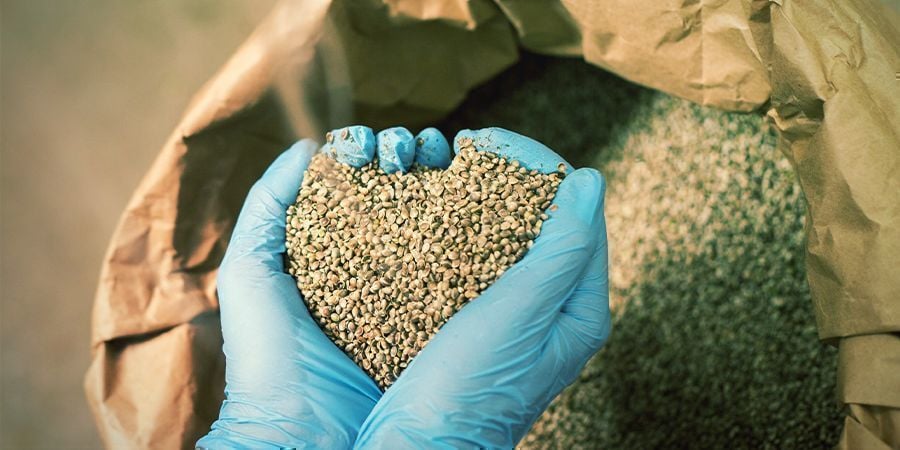
Consumers can enjoy the benefits of hemp seeds in various forms: You can find whole hemp seeds, shelled seeds, hemp seed oil, hemp milk, and products such as protein powder made from crushed seeds.
Whole Hemp Seeds
Whole hemp seeds are a good option for those who want the full amount of fibre and protein the seeds have to offer. Whole hemp seeds usually contain fewer oils since they are heat-treated to prevent germination, but they still offer the full amount of these nutrients. This makes hemp seeds great to just sprinkle on all kinds of foods, like salads, yoghurt, and smoothies.
Shelled Hemp Seeds
Sometimes also called hemp seed hearts, these are hemp seeds without the shell. Shelled hemp seeds are great if your priority is to benefit from the protein and omega fatty acids. Shelled seeds have a nutty flavour and go great with all types of food.
Hemp Seed Oil
Hemp seed oil is rich in essential fatty acids, which are considered “good fats” important for robust health. Hemp seed oil is a great alternative to cooking oils such as sunflower oil. It can easily be added to countless recipes to give them a healthy and tasty touch.
Hemp Protein Powder & Hemp Flour
Hemp protein powder is convenient if you want a quick way to add plant-based protein to shakes or yoghurt. You can also find “hemp flour”, which is great for baking, although this powder contains less than 35% protein, but more fibre.
Hemp Milk
Hemp milk has become a popular alternative thanks to its plethora of nutrients, good texture, and mild flavour. It can be added to tea, coffee, and other drinks, or consumed as is.
How to Consume Hemp Seeds
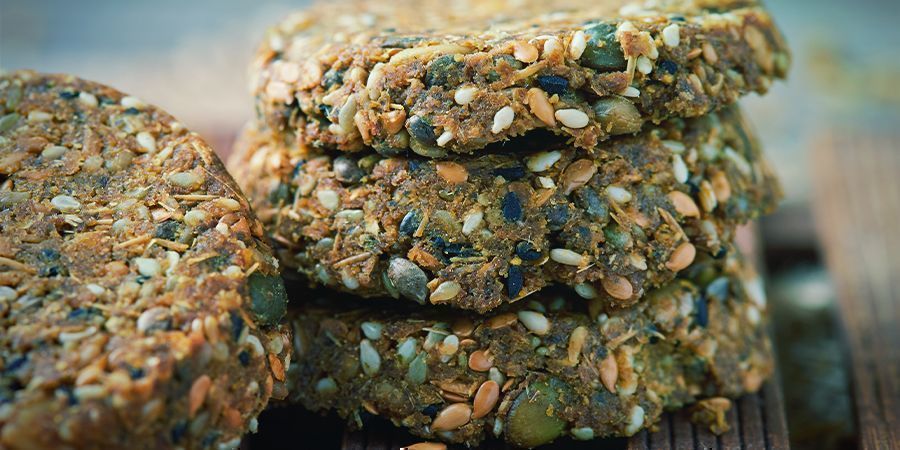
Depending on which form you choose (see above), you can consume hemp seeds in various ways. Each option may have its own perks or downsides, but ultimately it comes down to your taste and preferences.
Processing the Seeds Yourself
- Use hemp seeds as a topping for salads, yoghurt, oatmeal, and smoothie bowls.
- Add them to baked goods, from cakes and cookies to pastries and brownies.
- Add hemp seeds to stir fry dishes.
- You can grind up hemp seeds to make your own hemp flour or hemp milk.
Consume Ready-to-Eat Products Made With Hemp Seeds
If you don’t feel like cooking, you can also find plenty of ready-made snacks and other goodies containing hemp seeds.
How to Grow Hemp at Home
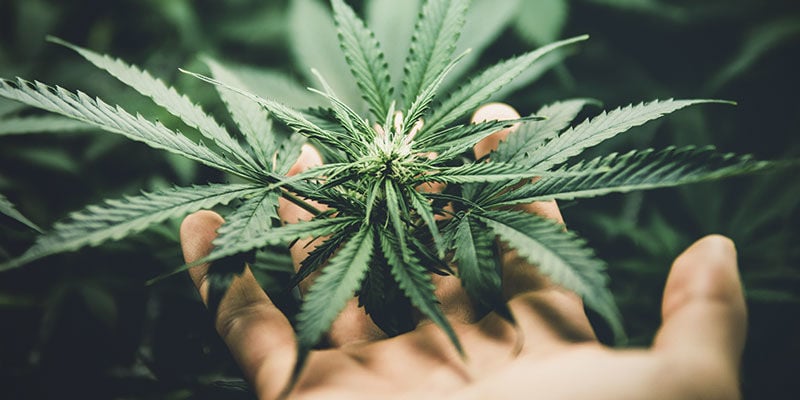
All throughout history, man has been cultivating hemp—and you can do so as well! Growing hemp at home isn’t difficult and can be a very rewarding pastime. If you want to give it a shot, check out the unique Hokkaido Japan Hemp by Ace Seeds, a rare landrace hemp strain from Japan!
Hokkaido Japan Hemp (ACE Seeds) regular
Growing hemp involves the following steps:
-
Select a suitable location
This can be a sunny spot in your garden or a spot on your terrace or balcony. If you don’t have one, no worries: Set up a grow tent in your home and start a nice indoor grow-op!
-
Sow the seeds
Next comes planting your seeds. For this, you can just use ordinary planters with potting soil, or you can plant outdoors in large containers or garden beds. If you want, you can even set up a fully fledged hydroponic growing system. Hemp is a forgiving plant that will perform well in many different environments.
-
Tend to your crops
Hemp doesn’t really require any “special care” for you to see good results. With just some basic attention (watering, cannabis nutrients, and some pest control to keep critters away), your plants will thrive.
-
Harvest
Once your hemp has matured some fat buds (which can take anywhere from 2–4 months), you can harvest your plants.
-
Process and store
The last steps after harvest are drying, curing, and storing your hemp flowers. These final actions are particularly important as it’s during these stages that buds will develop their full aroma and flavour.
For a detailed guide on how to grow your own cannabis (including hemp) with great success, see our comprehensive grow guide on indoor and outdoor growing.

- France
- Germany
- International
- Italy
- Netherlands
- Spain
- United Kingdom
- United States
You might also like
-
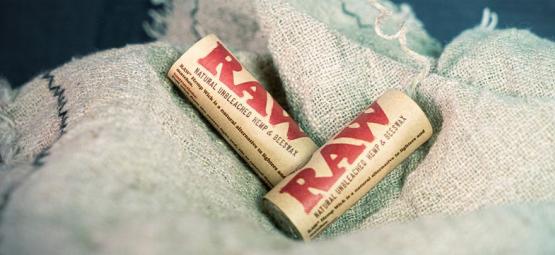
 3 min
17 November 2020
How (And Why) To Use Hemp Wick
You may have seen it: Someone pulls out what looks like a ball of string to light up a pipe or joint. It may seem long-winded, but there are good reasons for it. ...
3 min
17 November 2020
How (And Why) To Use Hemp Wick
You may have seen it: Someone pulls out what looks like a ball of string to light up a pipe or joint. It may seem long-winded, but there are good reasons for it. ...
-
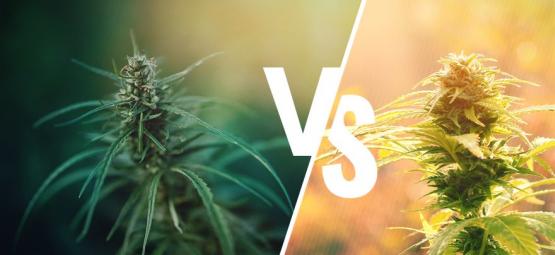
 5 min
26 October 2020
What's The Difference Between Cannabis And Hemp
Hemp and cannabis are commonly confused. Although they have a plethora of different uses that have the potential to change the medical and industrial worlds, these plants share the exact same roots. ...
5 min
26 October 2020
What's The Difference Between Cannabis And Hemp
Hemp and cannabis are commonly confused. Although they have a plethora of different uses that have the potential to change the medical and industrial worlds, these plants share the exact same roots. ...
-
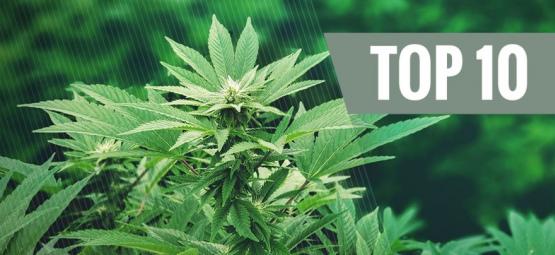
 5 min
28 August 2020
Top 10 Popular Uses For Hemp
In a world where we have become used to disposable, synthetic, and environmentally damaging products and processes, could hemp be the secret weapon in this fight against the "plastics age"? A practica ...
5 min
28 August 2020
Top 10 Popular Uses For Hemp
In a world where we have become used to disposable, synthetic, and environmentally damaging products and processes, could hemp be the secret weapon in this fight against the "plastics age"? A practica ...
-
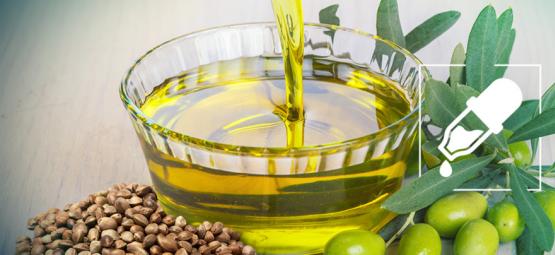
 3 min
28 January 2020
Which Is A Better Carrier For CBD, Hemp Seed Oil Or Olive Oil?
CBD oils are created using an array of different carrier oils—so which is better, hemp seed oil or olive oil? What about other carrier oils? ...
3 min
28 January 2020
Which Is A Better Carrier For CBD, Hemp Seed Oil Or Olive Oil?
CBD oils are created using an array of different carrier oils—so which is better, hemp seed oil or olive oil? What about other carrier oils? ...
-
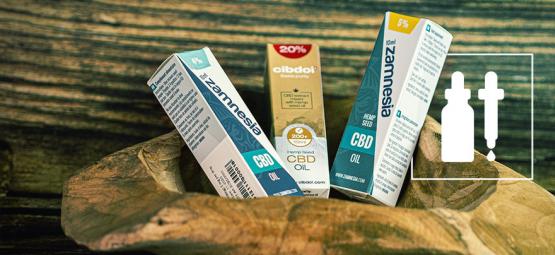
 3 min
18 November 2019
What's The Difference Between CBD Oil And Hemp Oil?
CBD has become a household name. With hundreds of CBD products available, it can be difficult to understand the differences. There's a lot of confusion surrounding the distinction between CBD oil and ...
3 min
18 November 2019
What's The Difference Between CBD Oil And Hemp Oil?
CBD has become a household name. With hundreds of CBD products available, it can be difficult to understand the differences. There's a lot of confusion surrounding the distinction between CBD oil and ...
-

 3 min
6 November 2019
Hokkaido Hemp: A Rare Japanese Landrace
The northern island of Hokkaido, Japan might seem like an unlikely place for a cannabis landrace to spring up, but that's precisely where Hokkaido hemp is flourishing. ...
3 min
6 November 2019
Hokkaido Hemp: A Rare Japanese Landrace
The northern island of Hokkaido, Japan might seem like an unlikely place for a cannabis landrace to spring up, but that's precisely where Hokkaido hemp is flourishing. ...
Categories
-
Seed Shop
- Feminized Cannabis Seeds
- Autoflowering Cannabis Seeds
- Regular Cannabis Seeds
- F1 Hybrids
- CBD Seeds
- Zamnesia Seeds
- Top 10 Autoflowering Seeds
- Top 10 Regular Seeds
- Top 10 USA Cannabis Strains
- Top 10 Zamnesia Seeds
- Top 10 Feminized Seeds
- Beginner Strains
- Below 1% THC
- Classic Cannabis Strains
- Cup Winners
- F1 Hybrids
- Fast-Flowering Strains
- High CBD Strains
- High THC Strains
- Mix Packs
- Zamnesia Exclusive Collabs
- Amnesia Seeds
- Blueberry Seeds
- Cheese Seeds
- Diesel Seeds
- Gorilla Seeds
- Haze Seeds
- Kush Seeds
- Purple Seeds
- Skunk Seeds
- White Widow Seeds
- Zamnesia Seeds
- ACE Seeds
- Advanced Seeds
- Amsterdam Genetics
- Anesia Seeds
- Auto Seeds
- Barney's Farm
- Big Buddha Seeds
- Bomb Seeds
- BSB Genetics
- BSF Seeds
- Buddha Seeds
- Bulldog Seeds
- Cali Connection
- Cannarado Genetics
- CannaBioGen
- CBD Crew
- CBD Seeds
- Compound Genetics
- The Dank Seeds
- Dark Horse Genetics
- Delicious Seeds
- Devil Harvest Original
- Dinafem
- DNA Genetics
- Doctor's Choice
- Dr. Underground
- Dutch Passion
- Elite Seeds
- Eva Seeds
- Exotic Seed
- Expert Seeds
- FastBuds
- Female Seeds
- Fenocan
- Flash Auto Seeds
- French Touch Seeds
- Garden of Green
- GeneSeeds
- Genehtik Seeds
- G13 Labs
- Grass-O-Matic
- Greenhouse Seeds
- Grow Your Own (DNA)
- Growers Choice
- Homegrown Fantaseeds
- House of the Great Gardener
- Humboldt Seed Company
- Humboldt Seed Organization
- Kalashnikov Seeds
- Kannabia
- The Kush Brothers
- Light Buds
- Little Chief Collabs
- Medical Seeds
- Ministry of Cannabis
- Mr. Nice
- Nirvana Seeds
- Original Sensible
- Paradise Seeds
- Perfect Tree
- Pheno Finder
- Philosopher Seeds
- Positronics Seeds
- Purple City Genetics
- Pyramid Seeds
- Rare Dankness
- Reggae Seeds
- Reserva Privada
- Resin Seeds
- Ripper Seeds
- Royal Queen Seeds
- Sagarmatha Seeds
- Samsara Seeds
- Seedstockers
- Sensation Seeds
- Sensi Seeds
- Serious Seeds
- Silent Seeds
- Soma Seeds
- Spliff Seeds
- Strain Hunters
- Sumo Seeds
- Super Sativa Seed Club
- Super Strains
- Sweet Seeds
- T.H. Seeds
- Top Tao Seeds
- Vision Seeds
- VIP Seeds
- White Label
- World Of Seeds
- Zativo Seeds
- Seed Banks
-
Headshop
-
Vaporshop
-
Healthshop
-
Smartshop
- Top 10 Smartshop
- Zamnesia Gift Cards
- After Party
- Aphrodisiacs
- Aromatherapy
- Blue Lotus
- CBD Vape Juice
- Capsule Machines
- Crystals, Gemstones & Minerals
- Dream Herbs
- Drug Tests
- Extracts
- Happy Caps
- Herbal Tea
- Herbs & Seeds
- Incense
- Kanna
- Kratom
- LSA Seeds
- Mescaline Cacti
- Microdosing
- Nootropics
- Relaxing
- Salvia divinorum
- Smart Seeds
- Stimulants
- Supplements
- Tinctures
- Vape Herbs
-
Shroomshop
-
Growshop
- Top 10 Growshop
- Top 10 Plant Seeds
- All Seeds
- Cacti
- Chilli & Pepper Seeds
- Companion Plants
- Edible Plant Seeds
- Exotic Seeds
- Flower Seeds
- Fruit Seeds
- Herb Seeds
- Interior Plant Seeds
- Microgreens
- Psychoactive Plant Seeds
- Sprouting
- Vegetable Seeds
- Wellness Plant Seeds
- After Harvest
- Climate Control
- Fertilizer
- Grow Tents
- Harvest, Dry & Cure
- LED Grow Lights
- Plant Seeds
- Propagation
-
Merchandise
-
Sale section
Account
Information
Our Offers
Our website won't work without these cookies activated. Therefore functional cookies can't be disabled.























